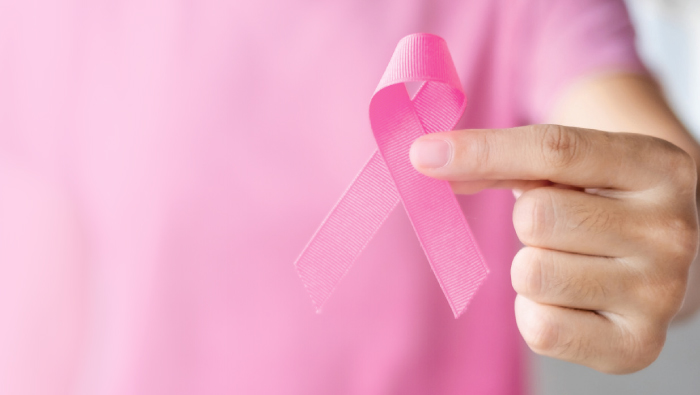
Breast cancer. It was the last thing Sarah wanted to hear. Sarah is not her real name, but she was 31 years old at the time, recently married, and hoping to get pregnant.
It's not just the diagnosis. Breast cancer is six years of your life: one for chemotherapy, and another five for hormonal or endocrine therapy. And the hormonal therapy could have reduced the chances of her ever getting pregnant.
Six years. Sarah could have had her eggs frozen and then, at the age of 37, tried in-vitro fertilization to have a child.
Sarah had indications of hormone receptor-sensitive early-stage cancer. So, she had it checked out. The doctors used a test backed by artificial intelligence (AI).
Luckily, the technology calculated a low risk — Sarah's tumor was deemed not aggressive and her risk of breast cancer recurrence over the next five years was low.
And today Sarah is a happy mother of a five-year-old child and completing hormonal therapy. She is one of 2,500 patients who were able to avoid chemotherapy through with the help of an AI-based prognostic test made by OncoStem Diagnostics in India. They are one of a few companies working in AI in South Asia.
The 'most common form of cancer'
Breast cancer was the most diagnosed form of the disease in women in 2020, with an increasing burden, especially in developing countries such as Afghanistan, Pakistan, and parts of Africa.
Nearly 685,000 women died of cancer in 2020. The number is expected to increase by up to 1 million deaths per year in 2040.
Higher income countries had higher incidence rates of cancer at that time, but mortality rates were lower. That was mainly due to better detection of small, early-stage tumors, including through technology based in artificial intelligence.
AI use in early detection and cancer screening
Artificial intelligence may have experienced a boom in public awareness since the launch of Open AI's ChatGPT in November 2022, but AI has been around for a while in healthcare and research. The use of machine learning for analyzing medical images began back in the 1980s.
Machine learning (ML) is a sub-field of AI. It's a technology that improves its performance over time and through experience. But for that, an ML needs masses of data with which to "train" itself.
These days, researchers say we have a level of data that's making these machines far more advanced than they were 40 years ago, and they're a whole lot more powerful, too. So, they seem to be seeing things that human doctors do not, or cannot, necessarily see.
Doctors often use mammograms for breast cancer screening — mammograms are X-ray images of the breasts. But we're learning that their efficacy is influenced by factors including the density of a woman's breasts.
Breast density is determined by the amount of fibrous and glandular tissue in a woman's breasts compared with the amount of fatty tissue.
Having dense breasts and poor imaging techniques make it harder for tumors to be detected in mammograms. And that is especially significant because, as the US Centers for Disease Control and Prevention notes, if you have dense breasts, you are at higher risk of getting breast cancer.
One study suggests that 10-30% of breast cancers can be missed by mammography.
"The use of AI is most impactful in early detection and prevention of cancer," said Mehr-un-Nisa Kitchlew, an AI researcher and the founder of RŌZ, a breast cancer detection startup that won The Microsoft Epic Challenge 2022 in Pakistan.
"When you are looking at a scan, it is one thing to have a professional opinion or several professional opinions. But sometimes there are some subtle nuances which the naked eye cannot pick up, but a well-trained AI can, and it helps with those detections," said Kitchlew.
AI's power of prediction
Humans are virtually incapable of making predicting with much certainty. We try, in some way, but if I had a life-threatening gene mutation and I asked doctors for my chances of a healthy life in the next ten years, only few would risk a prediction.
But AI will do just that. An AI can analyze the characteristics of a tumor — its size, number of affected lymph nodes, or associated protein expression. An AI can recognize patterns and correlations with different, subtypes of cancers.
It is a level of complexity and a scale of data that humans struggle to compute.
OncoStem says its prognostic test, CanAssist, is powerful enough to predict the risk of cancer for up to ten years. It ran a study with European patients.
It analyzes the expression of certain proteins and tells doctors whether the cancer will respond to a hormone treatment and whether they will need chemotherapy.
"Getting chemotherapy when it could be avoided can have many side effects on the patient. You lose hair, you can get infections very easily, or get leukemia. You can also get many neurological disorders," said Manjiri Bakre, co-founder and CEO of OncoStem Diagnostics.
Such tests were available in the US and Europe before OncoStem came onto the market. But in countries like India and Pakistan, they were expensive, and many patients could not afford them, said Bakre.
'Human intervention still needed'
Kitchlew said the possibilities for AI are endless, including robotic surgery.
But Bakre said human doctors are not done yet. "Human intervention is still needed because there can be errors [with AI]," said Bakre.
AI has a way to go in terms of understanding genetic patterns and finding personalized treatment plans that cater to a patient's specific genetic disposition.
And while Sarah was able to plan her life after cancer — thanks to AI — other women may not have been so lucky if they had more aggressive forms of breast cancer for which AI models have yet to be developed.